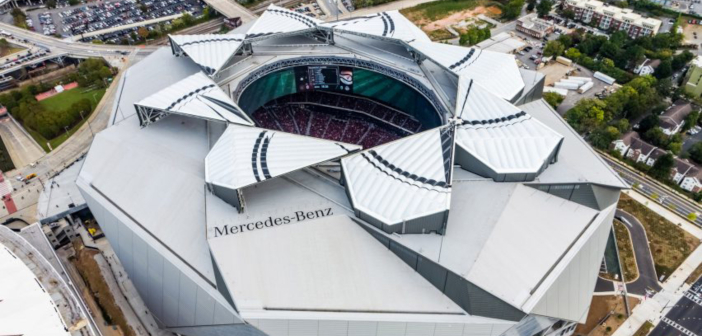The Mercedes-Benz Stadium in Atlanta, Georgia truly is a revolutionary sports venue. Not only in terms of its architecture, but also with innovative technology, this stadium creates an unique experience.
Last week, I wrote about why the new Tottenham Hotspur Stadium sets the latest standard for fan experience. This week I would like to have a look at a sports venue across the pond, which was opened in August 2017.
May I introduce?
The Mercedes-Benz Stadium has a capacity of up to 77,430 and is the home of the Atlanta Falcons (NFL) and Atlanta United FC (MLS). This multi-purpose sports venue has a retractable roof in the design of 8 triangular translucent panels, that when opened create one of the biggest optical illusions (watch the video below to see why). Furthermore, it features the first, 360 degree ‘halo board’ video screen. With a total cost of USD 1.6 billion, it is also one of the most expensive arenas in the world.
https://www.youtube.com/watch?v=vPJJtsItCdk
But what makes this stadium so special in terms of fan experience?
Reason 1: Partnership with market leader IBM
In order to lay out the technological foundations for a unique fan experience, the stadium operators, the AMB Sports and Entertainment Group and IBM, which according to Statista was the most innovative company in 2018, have joined forces. Additionally, IBM has a long history and a lot of experience in designing holistic digital experiences for some of the world’s most revered sports and entertainment venues.
Reason 2: Inclusive Approach with different Personas
As US-sports clubs increasingly have to deal with declining attendance numbers, the tenants of the Mercedes-Benz stadium were looking for a sports venue that could help interrupting this trend. According to Atlanta Falcons and Atlanta United FC owner Arthur Blank, the Mercedes-Benz Stadium should become a place beyond just simply where fans watch a game and support their team. It should be an arena, for which fans leave their homes and get a benefit out of that interpersonal experience at the venue itself.
In order to achieve that, IBM was already included in the planning phase. Together they developed multiple personas of people who would be using the stadium. Therefore, the Mercedes Benz Stadium was designed with an inclusive approach in mind. Whether it’s Lucy, the lifelong devoted Falcons fan or Ben with his two daughters traveling from California to Atlanta only to see United playing. It’s all about identifying these specific ‘groups’ of visitors, getting to know their individual needs and fears in order to deliver a sustainable and seamless experience.
Reason 3: Opting for a seamless experience
Once IBM has developed these different identities, they were trying to capture so-called ‘To Be Journeys’, which can be defined as roadmaps for visitors at the Mercedes-Benz Stadium. These ‘To Be Journeys’ not only help to identify each step and point when fans are interacting with their visit to the Mercedes-Benz Stadium, but they also give hints on what technology and platforms should be available.
In order to create this seamless and holistic experience, IBM has provided a true end-to-end integration solution, which consists of an integrated IT infrastructure, mobile applications and a cloud. From a fan perspective, especially the mobile applications are worth a look at.
Currently, there are three apps available. One for the Atlanta Falcons fans, one for supporters of Atlanta United FC and one ‘generic’ Mercedes-Benz Stadium app. Therefore, the app operates as kind of an interface between the stadium’s integrated technology and the fans before, during and after the visit. As an example, these apps not only provide access to multiple of services, including: ticketing, wayfinding, transportation or parking but also adapt to the different needs of each individual fan.
Data, Data, Data
As soon as people are actually using these apps, large amounts of data are being generated. Especially from a CRM-perspective this data is very valuable. As an example, it’s possible to analyse different fans’ lifetime value, based on that it’s a quick win to further tailor the services. Last but not least, considering all the pricing-related data, the owners could also look into dynamic pricing strategies. From my point of view, that topic will become increasingly important in the future.
Conclusion
In my opinion the Mercedes-Benz Stadium is a great example of of how today it’s no longer enough to build just an architecturally modern sports venue to offer a unique fan experience. There needs to be an integrated technology structure that should be taken into account as early as the planning phase.
Do you support my view? What do you think of the new Mercedes-Benz Stadium? Have you ever visited it and used the app(s)?
Let me know your feedback and leave a comment below.
Sources:
-Image: www.dezeen.com
-Video: Youtube, Fast Company



